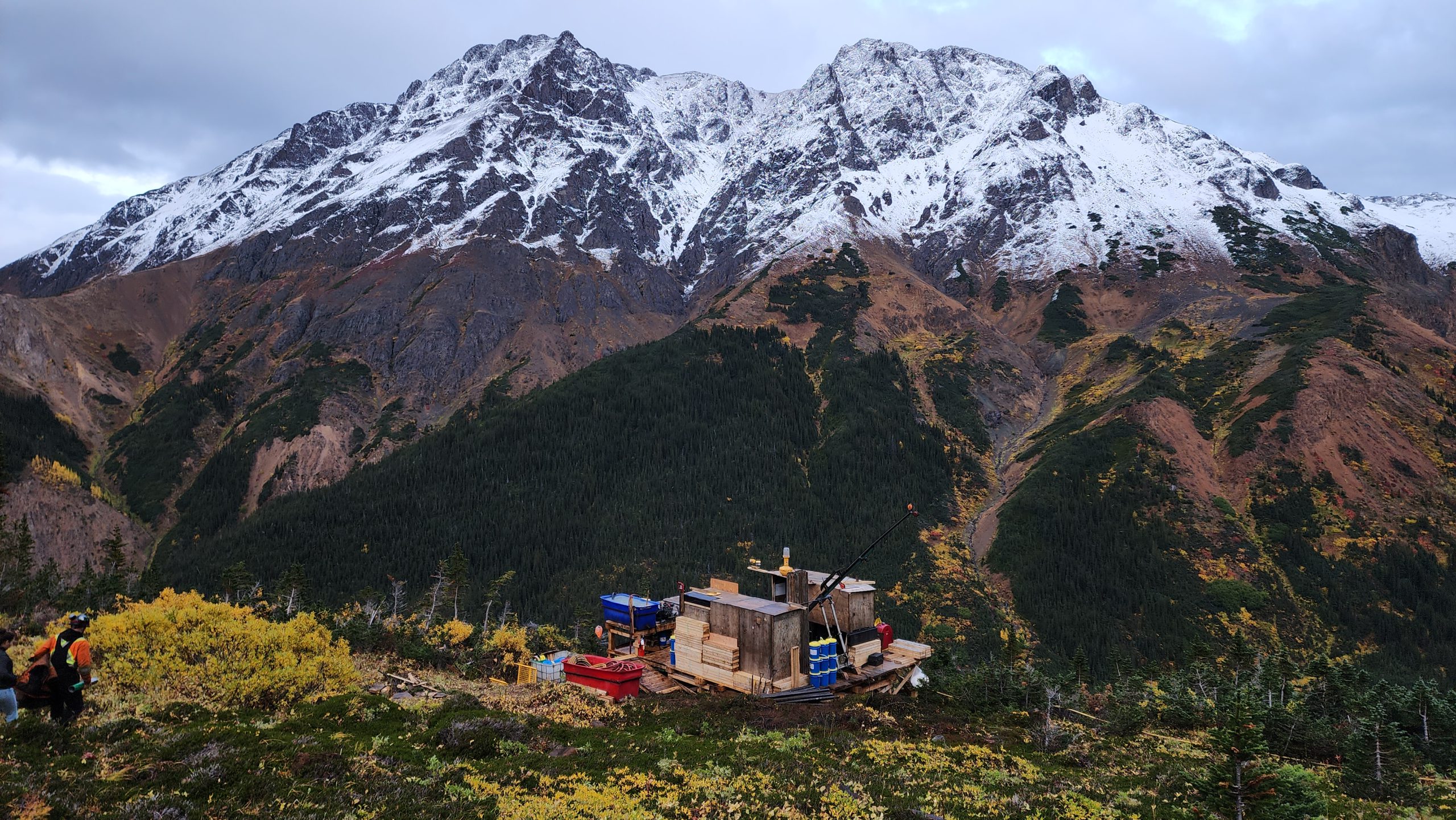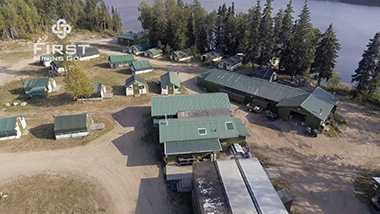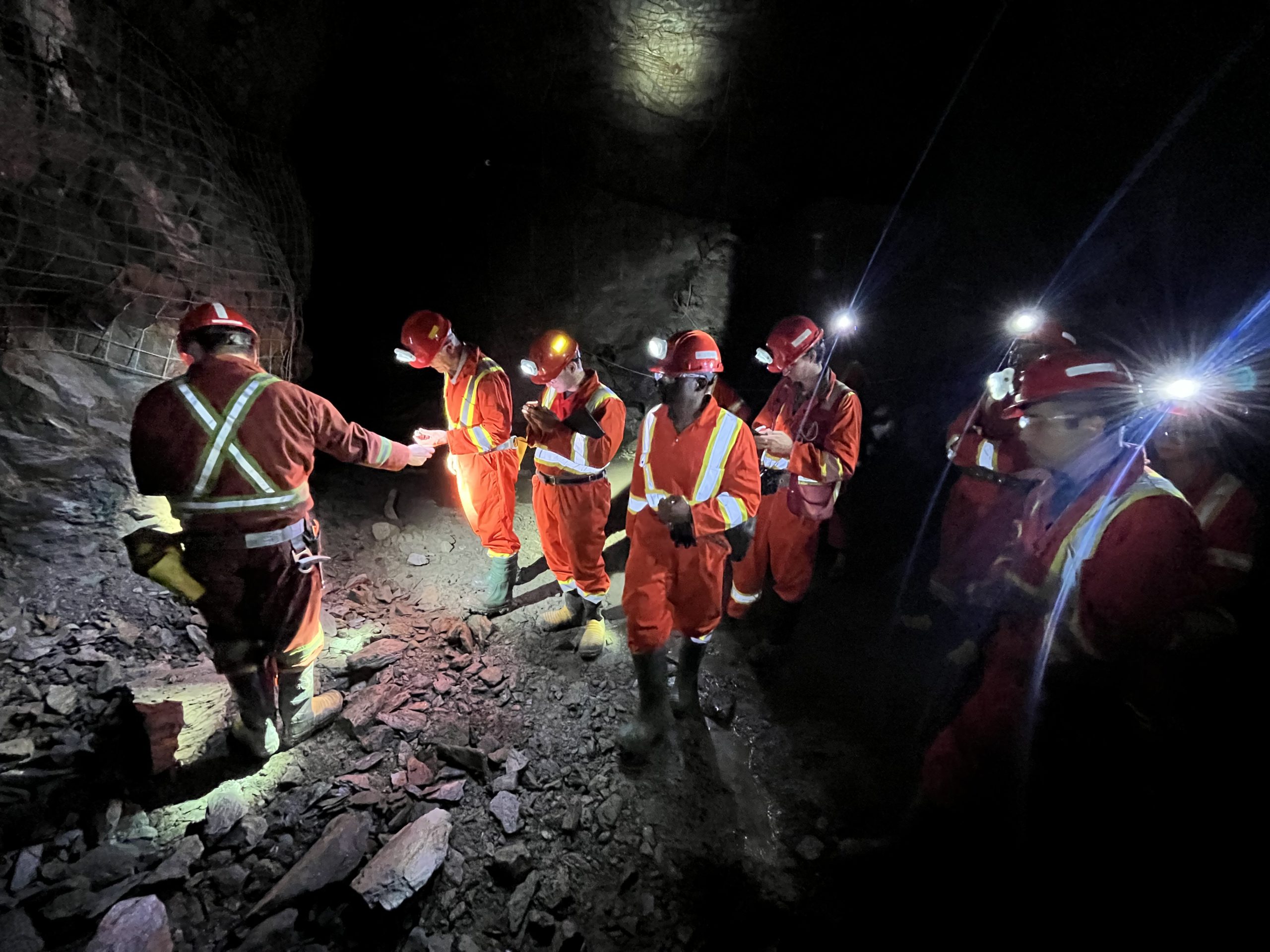The first new members of the night were William E. Roscoe and John T. Postle, joint inductees whose eight decades of combined work formed the system of mining consulting and standards development the industry now relies on.
Roscoe, an exploration geologist by training and Postle, a mining engineer, had both developed their own careers in mining before they first met in 1967, at Cominco’s Wedge mine in New Brunswick.
The two men also came from mining families. After receiving his CMHF award on stage, Roscoe told the audience about his father and grandfather – both mining engineers. His grandfather Harry L. Roscoe, who was educated in the United States, helped develop Noranda Mines in Ontario and Quebec and was inducted into the CMHF in 2007.
Postle’s father Larry also trained in the U.S. as a mining engineer and emigrated to Canada in 1929, said John’s daughters Kristen and Tricia Postle, who accepted the award on behalf of their father. Postle was unable to attend the gala due to poor health.
Postle and Roscoe later reconnected in the 1980s when they worked for consultancy David S. Robertson & Associates, and during lunch they would brainstorm about starting their own company. That became a reality in 1985 when they founded Roscoe Postle Associates (RPA).
“We really had no vision. We just hoped we could make a living,” Roscoe said in a video tribute.
As RPA grew, it reached a peak of 60 employees and formed a reputation as the gold standard for technical reporting.
On the side, the pair volunteered on committees with the Canadian Institute of Mining, Metallurgy and Petroleum (CIM), where they helped develop standards for the industry.
One of the highest achievements of their work was in Postle’s role in developing the CIM reserve/resources definition standards that became part of the industry standard of National Instrument 43-101, in 2000.
“If you want to get yourself a good partner, look for Bill Roscoe,” Postle said in the video, with a laugh.
“I think we had a good partnership,” Roscoe added. “[It started] out with the two of us in the same office space and the way things progressed from there, I think it’s kind of beyond our wildest expectations.”
Simple beginning leads to great discoveries
The second inductee was David Ross Bell, an exploration geologist from northern Ontario who’s credited with discovering and developing the Hemlo gold deposit on Lake Superior.
Thoroughly a child of the northern bush, Bell was born and raised in Kirkland Lake and attended what he described as a “two-room public school” for his first eight years of schooling.
“No running water. But anyway, I got educated,” he said in a video presentation.
In high school, Bell was introduced to the mining industry through a prospector friend of his father’s.
“In a way I enjoyed that. I didn’t get paid for it. But I think in the long run I got well paid for it,” he said with a laugh.
After completing a four-year geology program in three years at Carleton University, he went on to work at Dome mine and then in 1980 he founded his own consulting company. His first contract was with Corona Resources and he was sent to Hemlo, a deposit that had yielded limited success in the past.
Corona founder Nell Dragovan recalled Bell being calm, methodical and honest.
“I really thought about all these majors that have been there before and they turned it down,” she said in a video. “All these companies that had been there, probably would have said ‘no.’ But we said we would explore this property.”
Despite challenges with exploration at Hemlo, Dragovan trusted Bell’s assessment of the orebody’s potential.
Eventually, three mines were developed, including one named after Bell. They would produce about 22.4 million oz. of gold. Hemlo is still producing today.
In accepting Bell’s award on his behalf, his grandson Dante said he appreciated Dragovan for her trust and patience in him during those early exploration days at Hemlo. Bell was unable to attend the gala due to illness.
Bell’s persistent exploration activity helped lead to the creation of thousands of jobs in northern Ontario and stimulated local economies for more than three decades.
“That was one thing the mining industry did,” Bell said in a video. “They made sure in the early days, that their people were housed, they made a family and they made a community and I’m glad I was a part of that.”
On the shoulders of giants
Ross D. Lawrence is a founding partner of Watts, Griffis and McOuat (WGM) geology and mining consultancy. His induction into the CMHF makes him WGM’s fourth member to join the hall of fame ranks.
After receiving his award on stage at the ceremony, Lawrence cited the 1973 Broadway show A Little Night Music and its song “Send in the Clowns.” He explained that the song means to send in clowns when the show isn’t going well, a fitting remark for his self-effacing acceptance speech where he mostly praised the accomplishments of his partners at WGM, rather than his own.
Educated in geological engineering and mining finance at the University of Toronto in the 1950s, Lawrence went on to work with Murray Watts and John (Jack) McOuat on an asbestos project in northern Quebec. After it became a mine, the men were offered jobs with Asbestos Corp.
“We kind of looked at each other and said, ‘We don’t want to work for a big company. Why don’t we form a consulting firm?” he said in a video. Tom Griffis joined as well and WGM was born.
As the firm grew, its exploration work helped with the discovery of several mines, including Mary River, Raglan and Voisey’s Bay.
Soon Lawrence was working in the Middle East as WGM widened its focus internationally. His skills with economic analysis for feasibility studies served him well while exploring for ilmenite in Madagascar and helping with geological mapping in Iran.
He recalled a project that was financed by the World Bank where he advised the government of Yemen on policies that could promote the mining industry. Being people-oriented, Lawrence thrived while acting as a mentor to young Yemeni geologists.
He credited Watts with instilling in him “the restless urge to travel and venture out into the unknown.” He praised Griffis for his 18 years of work with WGN and for bolstering its reputation internationally. And for McOuat, whom Lawrence called his university classmate, consulting partner for 51 years and best friend, he said he was best known for his “indomitable persistence” and support of good projects.
“I am indebted to (them) for helping me build the road that lead me here tonight,” he said. “So please help me celebrate as we send in the clowns.”
An accountant among geologists
The last inductee of 2024 was Eric Sprott, the founder of finance company Sprott Securities (later Sprott Asset Management) that is regarded as a lifeline for junior miners.
An accountant by training, Sprott briefly worked in auditing and then in research analysis with Merrill Lynch, before he started his mining investment firm in 1981.
In a tribute video, he recalled how demanding the work could be.
“It’s not an eight-hour job,” he said. “I would be in here in the office at four in the morning, many mornings. But then you didn’t have the benefit of computers, so you had to do all your own reading of the various newspapers!”
Sprott also acknowledged that the mining industry produces more losers than winners, and seeing a project from exploration to production can take at least a decade. But the winners can enjoy “very, very large” payoffs.
As the years passed, his firm drew more interest and more clients and by 2010 he had worked with hundreds of companies, including in exploration, development and mining.
“They’d come through here by the dozens from all over the world looking for that Sprott cheque,” said SCP Resource Finance CEO Peter Grosskopf, in a video. Grosskopf was CEO of Sprott from 2010 until 2022.
“And it was the money, but it was also an endorsement and almost always it caused share prices to go up. So that’s what companies were looking for. I can’t think of another individual who has contributed as much money and investment and investment expertise to the sector than he has,” Grosskopf said.
Receiving his award on stage, Sprott said the event made it one of the happiest days of his life.
The veteran financier went on to caution about the dangers of unequal wealth distribution and short selling of stocks in Canada, South Korea and the U.S.
But looking on the positive side of the industry as a whole, he noted its economic benefits for the country, provinces and Indigenous people.
“I was quite impressed when it was suggested that this industry employs so many First Nations people,” he said. “That was most impressive.”
He also said that he’s a chartered accountant among geologists, even though he said many might ask how he found so much success in mining without having much skill in mining.
“And I always make the comment that, the geos are very busy trying to figure out: why is that rock there? And (I’m) sitting there saying, Hey, I don’t care what the rocks are, what the hell’s it worth?”




